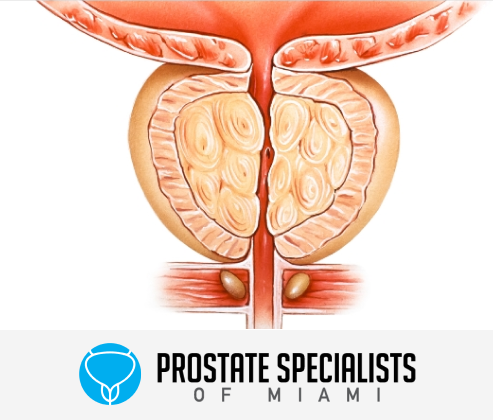PAE Procedure (Prostate Artery Embolization)
An enlarged prostate reduces your quality of life with symptoms like frequent urination, weak stream, and incomplete emptying of the bladder. Sleep deprivation often results because of the need for frequent trips to the restroom in the middle of the night. If you are tired of your prostate controlling your life, prostate artery embolization (PAE) may be a good option for treatment. We perform this procedure at Prostate Specialists of Miami in an office setting. Learn more about the procedure and schedule a consultation.
How Does a PAE Procedure Work?
A prostate artery embolization procedure is a minimally invasive treatment performed by an interventional radiologist (IR). The IR inserts a catheter into an artery through a small puncture in the wrist or groin. After placing the catheter, the IR uses imaging technology to move the catheter to the arteries that carry blood to the prostate on one side. Tiny particles are then injected through the catheter which blocks the blood flow to the prostate gland.
The IR will then, guide the catheter to the arteries that send blood to the other side of the prostate. The injection of particles will be repeated and once finished blood flow to both sides of the prostate will be reduced, and the gland will begin to shrink.
The procedure normally takes one to two hours, and you can go home the same day. However, you will need to bring a driver with you since you’ll be sedated for the procedure. In addition, you will need to spend an hour at the office after the procedure so the medical team can monitor you.
PAE Procedure Results
Your prostate will begin shrinking immediately following the procedure. You should notice a reduction in symptoms within three weeks. For most men, the results are quite long-lasting.
Recovering From a PAE Procedure
This outpatient procedure has a short recovery time and low complication rate and carries an extremely low risk of sexual dysfunction. Post-procedure effects are generally mild and can include mild pelvic pain or pressure, frequent urination, burning, and rarely nausea and low-grade fever. This is referred to as “post-embolization syndrome” and goes away within a few days.
Prostate artery embolization is a great choice for any man dealing with the distressing symptoms of an enlarged prostate gland. Find out if you’re a good candidate for the PAE procedure by contacting Prostate Specialists of Miami.
What is PAE?

Book An Appoinment
- Your Information Is Safe With Us
Take the 3 Minutes Quiz to Find Out if You Are Eligible for PAE


Frequently Asked Questions
BPH stands for benign prostatic hyperplasia. This is the medical term for an enlarged prostate gland. While enlarged, the gland is not cancerous.
You should seek medical treatment when you start showing signs of BPH. Go to a medical provider immediately if the symptoms are significant. Significant symptoms include blood in the urine, pain in the urinary tract or abdominal area, or painful and frequent urination. You also need to seek immediate medical care if you cannot urinate.
If you don’t seek treatment for BPH, you could develop long-term problems. Because BPH prevents the bladder from fully emptying, you can get urinary tract infections. The condition can also lead to bladder stones, incontinence, and blood in your urine due to an infection. Lastly, urinary retention is a possibility. This occurs when the obstruction is so significant that you cannot urinate.
You can develop a variety of symptoms as a result of an enlarged prostate. First, you might notice that you dribble when you finish urinating. You also might have to get up two or more times in the middle of the night to urinate. It can take longer to start urinating, and the stream might be weak. You also might have to strain to get the urine to come out.
Many men complain of a sudden, overwhelming urge to urinate. Urinating can be painful, and there might be blood in the urine. Eventually, you might become incontinent or lose the ability to urinate.
Dr. Adam Gropper
Dr. Adam Gropper is a board-certified Diagnostic & Interventional Radiologist. Before undertaking his medical training, Dr. Gropper was an engineer at General Dynamics Corporation, working on various projects including cruise missile guidance systems, “Star Wars” strategic defense simulations, and others. He is a lifelong “techie,” and has always been an early adopter and innovator of new technologies in treating vascular problems with minimally invasive approaches.
Dr. Gropper received his M.D. from Emory University, where he also completed his residency and fellowship training in Vascular & Interventional Radiology. He has been practicing in Florida since 1999. He has served as an Associate Professor at FIU Medical School and recently retired from his position as Chief of Radiology at Jackson North Medical Center after 10 years of service.
Why Choose Prostate Specialists of Miami?

- PAE is the least invasive option of all BPH treatments.
- PAE is performed in-office under mild sedation.
- With PAE there are no unwanted sexual side effects.
- PAE offers an easy recovery with most patients experiencing an improvement in symptoms within two to four weeks.
- PAE has a high rate of long-term success.
Real Patients, Real Testimonials
Get Your Life Back Today!
- Your Information Is Safe With Us






